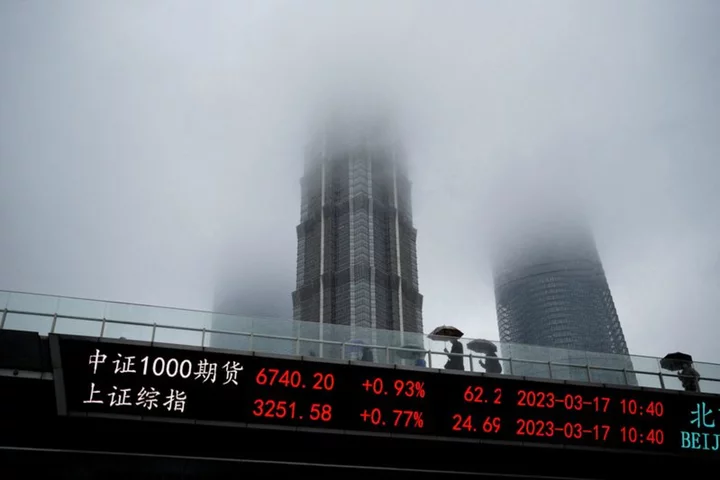By Ankur Banerjee
SINGAPORE Asian shares stumbled to a two-month low on Thursday, and the U.S. dollar rose as the impasse in negotiations to raise the U.S. debt ceiling undermined risky assets on worries about the hit to the global economy if the U.S. government defaults.
MSCI's broadest index of Asia-Pacific shares outside Japan fell 0.84% to 503.93, the lowest since March 21, and was on track for second straight month of losses.
China shares fell 0.53% while Hong Kong's Hang Seng index tumbled 2% to their weakest in 2023. The drop in these two markets weighed on MSCI's Asia ex-Japan index, whose top 10 constituents include Tencent Holdings, Alibaba Group Holding, AIA Group and Meituan.
Tokyo's Nikkei remained an outlier in the region and was up 0.5%.
Negotiators for Democratic President Joe Biden and top congressional Republican Kevin McCarthy held what both sides called productive talks on Wednesday as they race to reach a deal to raise the debt ceiling.
But with no resolution in sight traders remained wary of a possible and catastrophic default with U.S. Treasury Secretary Janet Yellen maintaining early June as a debt ceiling default deadline.
"There's a beginning of a sense that maybe this time is a little bit different," said Rob Carnell, ING's regional head of research, Asia-Pacific.
"Despite the comments that progress keeps being made, you just wonder, McCarthy gets a deal (and) whether even his own party will support it," he said. "So that's a concern."
Credit ratings agency Fitch put the United States on watch for a possible downgrade late on Wednesday, further dampening sentiment.
A downgrade could affect the pricing of trillions of dollars of Treasury debt securities. Fitch's move revived memories of 2011, when S&P downgraded the United States to AA-plus and set off a cascade of other downgrades as well as a stock market sell off.
"I hope Fitch knows the consequences of doing this and they're almost doing it just to try and put a bit of pressure on," ING's Carnell said. "It doesn't necessarily mean they will downgrade but it's like saying, 'you better be mindful, otherwise this is coming'."
Overnight, Wall Street's main indexes ended lower on debt-ceiling concerns.
E-mini futures for the S&P 500 rose 0.38%, while Nasdaq futures spiked 1.4% higher in early Asian hours after Nvidia Corp forecast second-quarter revenue more than 50% above Wall Street estimates.
The semiconductor company said it was boosting supply to meet surging demand for its artificial-intelligence chips, which are used to power ChatGPT and many similar services.
European stocks were set for a higher open, with the Eurostoxx 50 futures up 0.14%, German DAX futures 0.16% higher and FTSE futures up 0.21%.
On the monetary policy front, Federal Reserve officials "generally agreed" last month that the need for further interest rate increases "had become less certain," according to minutes of the May 2-3 meeting when the benchmark rate was raised a quarter-percentage-point to 5.00%-5.25%. Several officials said that hike might be the last.
Ray Attrill, head of FX strategy at National Australia Bank, said the minutes reflect the somewhat divided nature of much of the post-May meeting commentary from an array of Fed officials.
"Those advocating for the Fed to not be done at the current 5.0-5.25% do seem open to at least a pause in June," Attrill said.
Markets though are now pricing in 33.6% chance of a 25 basis point hike in June, compared with 28% last week, according to CME FedWatch tool.
Treasury bills maturing around June 1, the so-called X-date when the government runs out of money, have been under pressure for weeks and came in for further selling, pushing yields on securities maturing on June 1 to 7.628%.
The two-year U.S. Treasury yield, which typically moves in step with interest rate expectations, was up 7 basis points at 4.413%.
In the currency market, the dollar index, which measures the U.S. currency against six peers, rose 0.173%, touching a fresh two-month peak of 104.06.
The yen weakened 0.14% to 139.66 per dollar, while sterling was last trading at $1.234, down 0.19% on the day.
U.S. crude fell 0.17% to $74.21 per barrel and Brent was at $78.32, down 0.05% on the day.
(Reporting by Ankur Banerjee; Editing by Simon Cameron-Moore & Shri Navaratnam)

